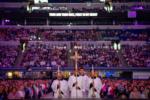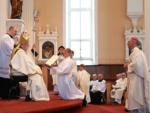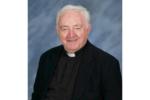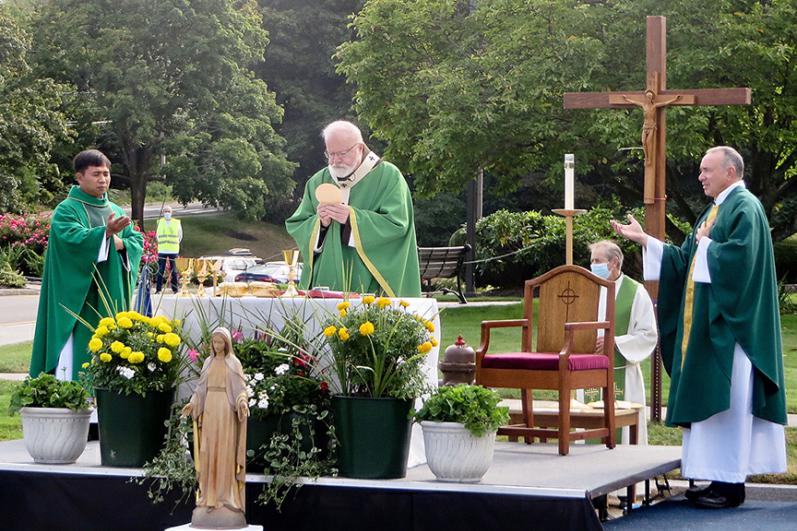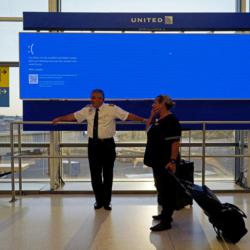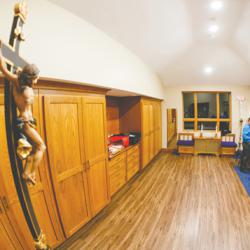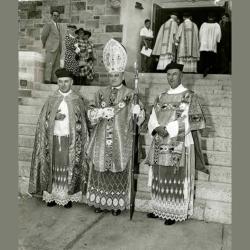Anything but ordinary
During the summer and the fall, at Sunday Masses, your missalettes or other worship aids will announce a sequentially numbered "Sunday in Ordinary Time." There is, of course, nothing ordinary about what we celebrate at Mass, what Christ has done and does for us both at Mass and on his mission following Mass.
This long liturgical season is the only one that touches all four climate seasons. All the summer Sundays, a few in winter, several in spring, and most of the fall Sundays are in this "green" "ordinary" time. Remember that the exact reverse happens below the equator!
Some may recall that there was a time when the "green" season had variable ways of referring to these Sundays. There was a group designated as "Sundays after Epiphany," basically between Jan. 6 and Ash Wednesday. Another group was designated as "Sundays after Pentecost." These ran from Trinity Sunday to the First Sunday of Advent. In some places, there were further designations. These designations ceased with the implementation of the new Roman Calendar. Since this calendar is the one given for the whole Church, only the Holy See can change it or permit changes by recognizing national, diocesan, or other particular calendars.
So here we are in non-ordinary Ordinary Time, and not just Sundays but also the weekdays to which there are no other celebrations assigned, mostly memorials, feasts, and solemnities of the Lord, the Blessed Virgin Mary, or the saints, and some blesseds these with permission of the Holy See.
You will probably notice that the Gospel readings on these Sundays are, for the most part, from just one evangelist each year. Prior to the Gospel will be a first reading during this time from the Hebrew Scriptures or Old Testament. This is followed by selections from another Old Testament book, Psalms. The psalms most often reinforce or echo the first reading; this also happens when the First Reading is from the New Testament, in the Easter Season. The second reading is from the New Testament, mostly from the Letters of St. Paul or from one of the other apostolic letters.
The variable prayers of this season -- collect, prayer over the gifts, and post-communion prayer -- are assigned to each week. They ought to be used on the Sunday to which they are assigned. However, there is great latitude allowed to celebrants because on the other "green days," weekdays in ordinary time, the set of texts for one week could be used in another. So, for example, the celebrant could use all the Mass Prayers for the 10th Sunday in Ordinary in the weekdays of the 18th Week in Ordinary time.
During this ordinary time, the Scriptures bring us into the sacred history of the Chosen People of Israel; they provide guidance and direction from the "pens" of the apostles; and above all in the Gospel, Jesus Christ himself continues to preach his challenging and consoling message of salvation.
Often, but in very different language, that sacred history, the apostolic witness, and the preaching of Jesus will appear in the prayers of the Mass by a hint, through an image, or by a single word.
For the preacher of homilies, this season gives him to base a homily -- on scriptural texts; on the prayers of Mass, either the variable one as described above or the ordinary ones, e.g. the Eucharistic Prayers. In any event, here is what a homily succinctly should be: "It should be an explanation of some aspect of the readings from Sacred Scripture or of another text from the Ordinary or the Proper of the Mass of the day and should take into account both the mystery being celebrated and the particular needs of the listeners." (General Instruction of the Roman Missal, 2003, #65)
For pastoral musicians, this is an extended time for use of both well-known music and for the introduction of the new. Here in the northern hemisphere, this can be a challenge because often parishioners are away on vacation in our summer months. And if you are in a vacation area, that parish's music might not be familiar to you.
This is also a great time to celebrate Masses at the back of the Missal. The variety of Masses for Various Needs and Occasions focuses on many ecclesial, societal, human, and civic intentions and needs. This is also a wonderful time to pray the four Eucharistic Prayers for Various Needs and Occasions in conjunction with the suggested Mass texts.
Even these few reflections, I hope, give us all a reminder that there really is nothing ordinary about ordinary time.


